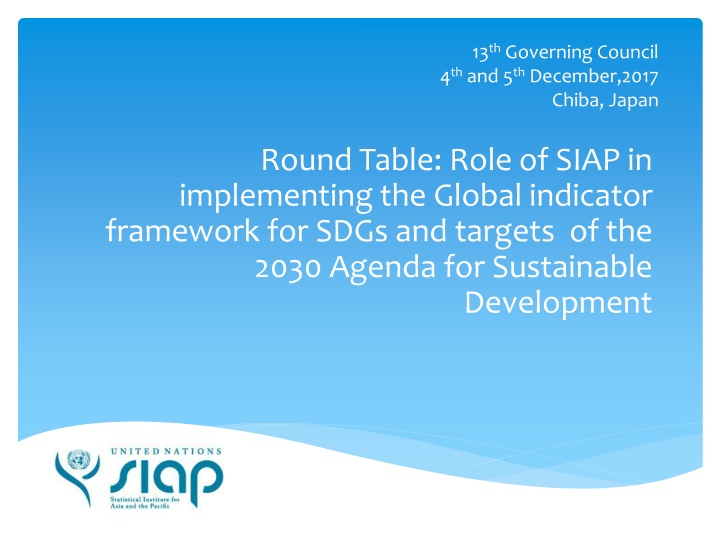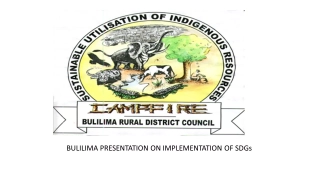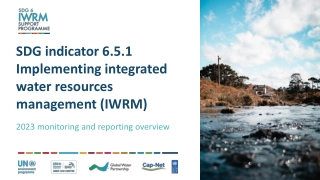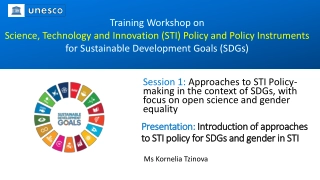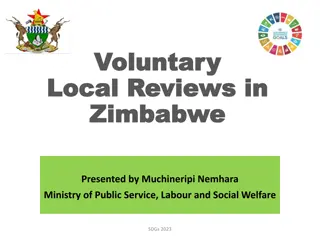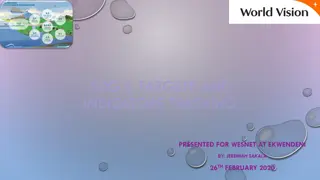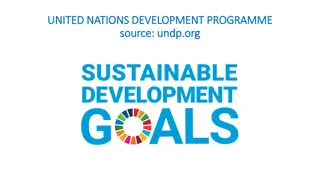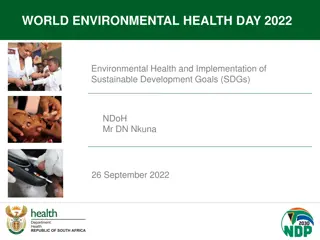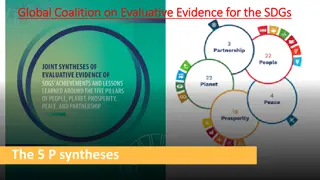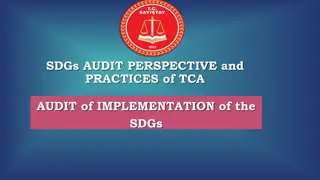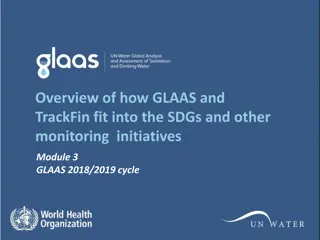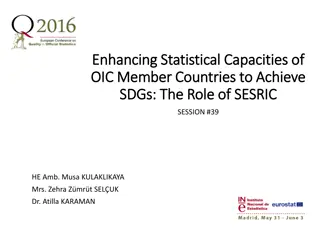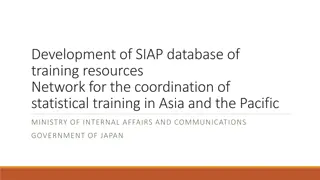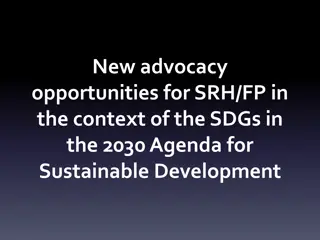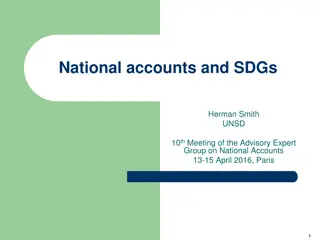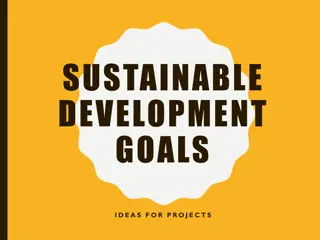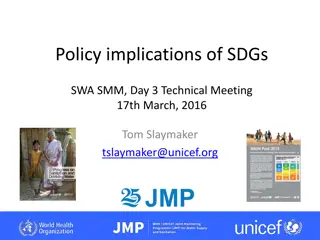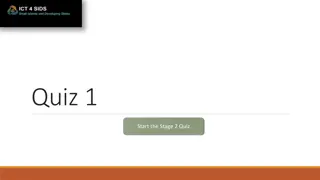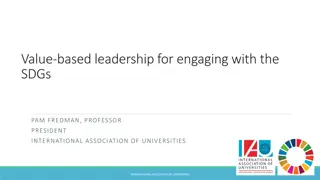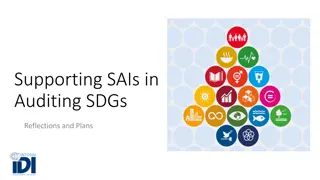Role of SIAP in Implementing Global Indicator Framework for SDGs
The 13th Governing Council held in Chiba, Japan, discussed SIAP's role in implementing the Global Indicator Framework for the Sustainable Development Goals (SDGs) of the 2030 Agenda. The United Nations Resolution on Agenda 2030 outlines the transformative goals and targets to be achieved by 2030. Monitoring of SDGs has been entrusted to the UN Statistical Commission, which developed a comprehensive Global Indicator Framework with voluntary, country-led indicators. The main recommendations include refining indicators annually, conducting reviews in 2020 and 2025, and integrating new data sources. The Global Indicators for SDGs divide targets into three tiers based on methodology and data collection.
Download Presentation

Please find below an Image/Link to download the presentation.
The content on the website is provided AS IS for your information and personal use only. It may not be sold, licensed, or shared on other websites without obtaining consent from the author.If you encounter any issues during the download, it is possible that the publisher has removed the file from their server.
You are allowed to download the files provided on this website for personal or commercial use, subject to the condition that they are used lawfully. All files are the property of their respective owners.
The content on the website is provided AS IS for your information and personal use only. It may not be sold, licensed, or shared on other websites without obtaining consent from the author.
E N D
Presentation Transcript
13thGoverning Council 4thand 5thDecember,2017 Chiba, Japan Round Table: Role of SIAP in implementing the Global indicator framework for SDGs and targets of the 2030 Agenda for Sustainable Development
UN Resolution on Agenda 2030 UNGA resolution of Agenda 2030 on 25th Sept 2015 Transforming Our World: the 2030 Agenda for Sustainable Development 17 Goals 169 targets To be achieved by 2030
Monitoring of SDGs Entrusted UN statistical Commission to develop Global Indicator Framework Commission established Inter Agency Advisory Expert Group (IAEG) IAEG gave its report to the commission in March 2017 The report has been accepted
Main recommendation of UN Statistical Commission adopted by HLPF and ECOSOC Global Indicator framework developed by IAEG SDG (E/2017/24-E/CN.3/2017/35) Voluntary and country- led Indicators to be refined annually Comprehensive reviews in 2020 and 2025 Complemented by regional and national indicators
Main recommendation of UN Statistical Commission Develop international standards, methods and guidelines Further refine and improve the global indicator framework Coverage, alignment with targets and definition of terms and development of metadata Ensure consistency of data Official statistics and data from NSS are the basis Integrate new data sources in data systems NSOs to be coordinator of NSS
Global Indicators for SDGs Monitoring of targets by Indicators So far identified 232 indicators (March,2017) Divided in 3 tiers Tier-I (88) : Conceptually clear, accepted methodology and standards exist Data is being collected in at least 50% countries or population in a region Tier II (70) : Conceptually clear, accepted methodology and standards exists Data is not being collected by large number of countries Tier-III (93) : Accepted methodology and standard does not exist and these are being developed
Recommendation of the Committee of Statistics in fifth Session (14-16 December, 2016) Identified 5 action areas for advancing official statistics for SDG monitoring One of the area is Having requisite skill set Appropriate guidance material and training Combined skillset of the staff of NSS Capable management Sufficiency of human resources Recommended delivery of training by various methods and content Network of Statistical Training Institutions Other modes of training 7
Statistical Business Processes in Use National Accounts statistics Estimation of GDP (Annual and quarterly) Supply and Use Tables Tourism Satellite account Population Census Agriculture Census Economic and Environment Account(SEEA) and Environment Statistics (FDES)
Statistical Business Processes in Use International Comparison Programme Purchasing Power Parity (PPP) Civil Registration and Vital Statistics Registration of birth Registration of death with causes of death Data on prices of various commodities (Consumer prices / Producer prices) Epidemiological surveys
Statistical Business Processes in Use Tax revenue data Production of alcohol Balance of Payment Statistics Analysis of Budget of Central/ State and local Governments
Large scale Sample Surveys VIII. Time use survey IX. Agriculture survey (Yield, Farmers, area, commodity- wise, income and expenditure survey of farmers) X. Transport survey ( by mode of travel) XI. Survey on Fish catch (Fishery census, Special surveys) XII. Business Register-Enterprise surveys XIII. Economic Census XIV. Food security (Food Balance Sheet) XV. Surveys on type of skills I. II. III. HIES DHS/ NFHS Educational Survey (Quality of education) Health Survey Multi Integrated Cluster Survey (MICS) Labour Force Survey VII. ICT skill survey IV. V. VI.
No one is left behind!!! Disaggregated information on all the relevant variable Income Sex Age group Geographical location (Rural / Urban) Race Ethnicity Migratory status Disability
Strategy adopted for Training relating to SDGs Reorientation of long term courses Reorientation of Short term courses Management Programmes E-learning Programmes 13
Numbers in the last two years Provided training to 161 participants in SDG related courses Men -92, Female- 69 46 in long term courses 115 in short term courses 14
Trainings related to SDG monitoring in last two years Improving Capability in Producing Official Statistics for Monitoring the Post-2015 Sustainable Development Goals (4 month two courses-2016 and 2017) 15
Workshops Policy Analysis: Transition towards Sustainable Agriculture in the context of the 2030 Agenda for Sustainable Development, Bogor Data and Statistics for Sustainable Development Goals (SDGs), Greater Noida Workshop on Data and Statistics for Sustainable Development Goals (SDGs), Almaty and Baku for Central Asia Informality: Definitions, Measurement, SDGs and Other Policy Indicators, Chiba 16
